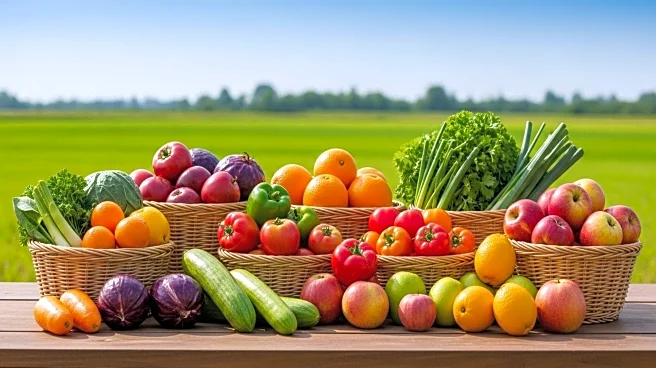What's Happening?
In Southern Africa, strategic partnerships are driving significant advancements in smallholder farming productivity. The collaboration involves local National Agricultural Research and Extension Systems (NARES), NGOs like Solidaridad/KVUNO, and the CGIAR Sustainable Farming Science Program. This initiative focuses on integrating soybean into maize-based farming systems in Malawi, Mozambique, and Zambia. The program emphasizes the use of FAIR data principles—Findable, Accessible, Interoperable, and Reusable—to enhance decision-making across the agricultural value chain. By leveraging data-driven practices, the partnership aims to address challenges such as climate variability and market volatility. A decision support tool is being developed to guide farmers on fertilizer use, planting dates, and crop variety selection. Training sessions have been conducted to improve data collection skills among field agents, ensuring high-quality agronomic data is gathered to optimize farming practices.
Why It's Important?
This initiative is crucial for improving agricultural productivity and sustainability in Southern Africa. By focusing on data-driven approaches, the program empowers smallholder farmers to make informed decisions, potentially increasing crop yields and resilience against environmental challenges. The use of accurate and actionable data can lead to better resource allocation and long-term planning, benefiting not only farmers but also researchers and policymakers. This approach could serve as a model for other regions facing similar agricultural challenges, promoting food security and economic stability. The collaboration also highlights the importance of partnerships in scaling innovative agricultural practices, which can lead to significant socio-economic benefits for rural communities.
What's Next?
The program plans to expand its training and data collection efforts across additional regions in Malawi, Mozambique, and Zambia. By standardizing data collection protocols and enhancing the digital agriculture ecosystem, the initiative aims to extend its impact to more smallholder farmers. The trained field agents will disseminate their knowledge to lead farmers, ensuring consistent and high-quality data collection. This expansion is expected to further refine agricultural practices and improve productivity, ultimately contributing to the broader goal of sustainable agricultural development in the region.
Beyond the Headlines
The initiative underscores the transformative potential of digital agriculture in addressing global food security challenges. By focusing on data quality and usability, the program not only enhances current farming practices but also lays the groundwork for future innovations in agriculture. The emphasis on FAIR data principles ensures that the insights generated are reliable and applicable, fostering a culture of data-driven decision-making in agriculture. This approach could lead to a paradigm shift in how agricultural data is collected, analyzed, and utilized, with implications for policy development and resource management on a global scale.









